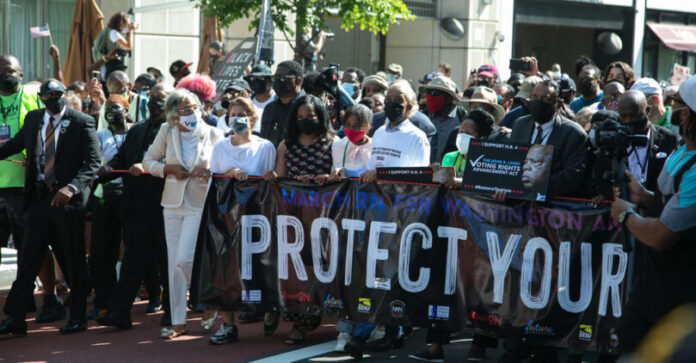
By Stacy M. Brown, NNPA Newswire Senior National Correspondent
A federal court has granted a request by Disability Rights Mississippi, the League of Women Voters of Mississippi, and three state voters to block S.B. 2358 — a newly implemented law that significantly diminishes access to the ballot for Mississippians who need assistance with voting.
Under the Court’s order, Mississippi voters who need assistance due to disability, blindness, or inability to read or write may select a person of their choice to assist them with delivering or returning their absentee mail-in ballot.
The Court ruled S.B. 2358 violated Section 208 of the Voting Rights Act of 1965, and the state cannot use that law to punish individuals who assist such voters.
The order will apply to the current primary and the upcoming general elections in November.
“Mississippi voters in need of assistance to vote can be assured that their voices will be heard at the ballot box,” said Peg Ciraldo, co-president of the League of Women Voters of Mississippi.
“The League and its members can now continue its critical work to advocate for all voters, especially those who depend on us to return their absentee ballot.”
Celina Stewart, the chief counsel and senior director of advocacy and litigation at the League of Women Voters, called Mississippi’s S.B. 2358 part of a trend in laws targeting voter services organizations that assist voters.
“We’re pleased that the Court here has blocked this law to protect the vital work done by organizations like the League and the voters who would be disenfranchised by preventing those organizations from assisting them,” Stewart asserted.
According to the Mississippi Free Press, The Mississippi Legislature passed and Gov. Tate Reeves signed Senate Bill 2358 into law earlier this year.
It lists five exceptions for those who can transmit ballots, including election officials engaged in official duties; employees of the U.S. Postal Service engaged in official duties; other individuals allowed by federal law to collect and transmit U.S. mail while engaged in official duties as authorized by law; a “family member, household member, or caregiver of the person to whom the ballot was mailed”; and a “common carrier that transports goods from one place to another for a fee.”
The publication noted that the law stated that anyone else who transmits ballots and violates the law “shall” be subject to a misdemeanor criminal charge that includes imprisonment of up to one year in county jail and/or a fine of up to $3,000.
But plaintiffs argued that the law is not clear in its definitions, including its definitions of who constitutes a “family member, household member, or caregiver.”
In May, the three plaintiffs sued the State with the help of Disability Rights Mississippi, the Mississippi Center For Justice, the Southern Poverty Law Center, the American Civil Liberties Union, the ACLU of Mississippi and the League of Women Voters of Mississippi.
One of the plaintiffs, William Earl Whitley, a Black disabled U.S. Army Veteran from Okolona, Miss., lost both legs in Vietnam.
The other two plaintiffs are Yvonne Gunn and Mamie Cunningham, two local community members who have long helped Whitley by collecting and mailing his ballots on his behalf.
The judge noted in his ruling that Section 208 of the Voting Rights Act of 1965 says that “any voter who requires assistance to vote by reason of blindness, disability, or inability to read or write may be given assistance by a person of the voter’s choice, other than the voter’s employer or agent of that employer or officer or agent of the voter’s union.”
“This court, however, cannot, from the language of the statute, ascertain whether the individual Plaintiffs who previously have provided assistance to eligible disabled voters for many years clearly meet that definition.”
“This court, further, has not guideposts as to which individuals may be deemed ‘family members’ or ‘household members’, the other exempted assistors,” he added.
“This statute, then, vests prosecuting authorities with broad discretion in relying upon their own definitions of these vital terms—caregiver, family members, or household members.”
Ming Cheung, the staff attorney with the ACLU’s Voting Rights Project, called the ruling a huge win for voters.
“We are pleased that voters with a disability or language barrier can continue receiving assistance with their ballot, the same way that they have in past elections,” Cheung said.
“Rather than making voting harder, Mississippi should pass legislation to expand opportunities for voting so that all citizens can participate in their democracy.”
Mississippians may now continue to assist voters without the fear of prosecution, said Ahmed Soussi, SPLC’s Voting Rights Practice Group staff attorney.
“We are glad that the Court recognized the federal guarantee to voters with a disability or language barrier to select a person of their choice to provide them assistance. What is important now is to make sure everyone who is eligible to vote does vote in the upcoming elections,” Soussi stated.



